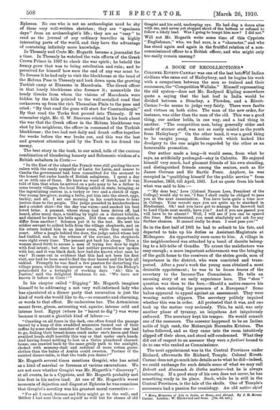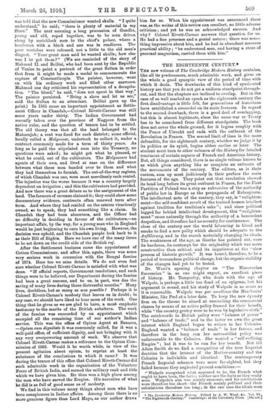A BOOK OF RECOLLECTIONS.*
COLONEL RIVETT-CARNAC was one of the last batctiSf Indian civilians who came out of Haileybury, and he begins his work with a comparison between the men so trained and their successors, the "Competition Wallahs." Himself representing
the old system—does not Mr. Rudyard Kipling somewhere quote a saying that the last loaf in India would be divided between a Strachey, a Plowden, and a Rivett- Carnac P—he seems to judge very fairly. There were faults and virtues on both sides. The man of the new order, for instance, was older than the man of the old. This was a good thing, our author holds, in one way, and a bad thing in another. "The competition man, being generally older and made of sterner stuff, was not so easily misled as the youth from Haileybury." On the other hand, it was a good thing to be caught young. Routine work which looked like drudgery to the one might be regarded by the other as an honourable promotion.
Our author made a long—it would seem, from what he says, an artificially prolonged—stay in Calcutta. He enjoyed himself very much, had pleasant friends of his own standing, and distinguished friends among the seniors, such as Sir James Outram and Sir Bartle Frere. Anyhow, he was occupied in "qualifying himself for the public service" from November, 1858, till April, 1861. Let us quote from his book what was said to him :—
" 'My dear boy,' Lees [Colonel Nassau Lees, President of the College] would say to me, fear I shall really be obliged to pass you at the next examination. You have been quite a time now in College. Your munshi says you are quite up to standard in Hindustani. Oh! and you have got to manage the farewell ball to Lord Clyde next month, have you P And if you are passed you will have to be absent ? Well, I will see if you can be spared this time. But understand, you must absolutely not ask for any further chances. It cannot really be done. I must pass you."
So in the first half of 1861 he had to submit to his fate, and departed to take up his duties as Assistant-Magistrate at Midnapore. An opportunity soon came to him. A village in the neighbourhood was attacked by a band of dacoits belong- ing to a hill-tribe of Gondlis. To arrest the malefactors was easy enough ; a more important achievement was the bringing of the guilt home to the receivers of the stolen goods, men of
importance hi the district, who were convicted and trans- ported. After a year's work the young man obtained a most desirable appointment; he was to be locum tenens of the secretary to the Income-Tax Commission. He tells an amusing story of an early experience here. The " shoe " question was then to the fore,—Should a native remove his
shoes when entering the presence of a European ? Some babus appeared to appeal against an assessment. They were wearing native slippers. The secretary politely inquired whether this was in order. All protested that it was, and one took up the matter very seriously. This, he said, was only another phase of tyranny, an iniquitous Act iniquitously enforced. The secretary kept his temper. He would consult
one of the assessors. The assessor happened to be an Indian noble of high rank, the Maharajah Harendra Krishna. The babus followed, and as they came into the room intuitively slipped off their shoes, and stood self-condemned. What they did out of respect to an assessor they were a fortiori bound to do to one who ranked as Commissioner.
The next appointment was in the Central Provinces under Richard, afterwards Sir Richard, Temple. Colonel Rivett- Carnac does not go much into details as to what he did—indeed, we could exchange for such details some of what we may call
Debrett and Almanach de Gotha matter—but he is always interesting. If a good story of his own does not occur, he has something ready in its place. Such, while be is still in the
Central Provinces, is the tale of the skulls. One of Temple's successors had a passion for craniology. An old native chief
• Many Memories of Life in India, at Home, and Abroad. By T. lf. Rivet Caroac. London: W. Blackwood and Sons. [lOB. ed. net.] was told that the new Commissioner wanted skulls. "I quite understand," he said; "there is plenty of material in my State." The next morning a long procession of Gondhs, young and old, roped together, was to be seen driven along by matchlock men to the chief's palace, where a headsman with a block and axe was in readiness. The poor wretches were released, not a little to the old man's disgust. "Your great man said he wanted skulls; how else was I to get them ?" (We are reminded of the story of Mahmud II. and Bellini, who had been sent by the Republic of Venice to paint a portrait of the great Sultan in order that from it might be made a medal to commemorate the capture of Constantinople. The painter, however, went on with his ordinary work and filled other canvases. Mahmud one day criticised his representation of a decapita- tion. "The blood," he said, "does not spout in that way." The painter persisted. "Bring a slave and let us see," said the Sultan to an attendant. Bellini gave up the point.) In 1865 came an important appointment as Settle- ment Officer in Chandah,—Colonel Rivett-Carnae was still some years under thirty. The Indian Government had recently taken over the province of Nagpore from the native ruler, and the question of tenure had to be settled. The old theory was that all the land belonged to the Maharajah; a rent was fixed for each district; some official, locally called a Malgoozar, undertook to collect it, under a contract commonly made for a term of thirty years. As long as he paid the stipulated sum into the Treasury, no questions were asked; he might get what he pleased, or what he could, out of the cultivators. The Malgoozars had agents of their own, and lived at ease on the difference between what these men handed over to them and what they had themselves to furnish. The out-of-the-way regions, of which Chandah was one, were most mercilessly rack-rented. The injustice was the worse because it was a country largely dependent on irrigation ; and this the cultivators had provided. And now there was a great debate as to the assignment of the land. The farmers of revenue claimed it; they could show some documentary evidence, contracts often renewed term after term. And where they had resided on the estates vicariously owned, so to speak, they had something like a claim. In Chandah they had been absentees, and the Officer had no difficulty in deciding in favour of the cultivators,—an important affair, by the way, for a young man who in England would be just beginning to earn hie own living. However, the decision was upheld, and the Chandah people look back to it as their Bill of Rights. Here we have one of the many items to be set down on the credit side of the British raj.
After the Settlement business came the appointment of Cotton Commissioner, and after this, again, there was some very serious work in connexion with the Bengal famine of 1874. Here too we miss details. We do not even feel sure whether Colonel Rivett-Carnac is satisfied with what was done. "If official reports, Government resolutions, and such things were to be believed, our Department during the famine had been a great success, and to HS, in part, was due the saving of many lives during those distressful months." Many lives, doubtless, but as many as was possible ? Perhaps it is Colonel Rivett-Carnac's modesty that leaves us in doubt; in any case, we should have liked to hear more of the work. One thing that he gives us we are glad to have, a most emphatic testimony to the merits of the British subaltern. The work of the famine was succeeded by an appointment which occupied all the remaining time of our author's Indian service. This was the office of Opium Agent at Benares, —Opium cuss dignitate it was commonly called, for it was a well-paid office, of sufficient dignity, and not bringing with it any very overpowering amount of work. We observe that
Colonel Rivett-Carnac makes a reference to the Opium Com- mission of 1893. Would it be worth while, in view of the present agitation about opium, to reprint at least the substance of the conclusions to which it came ? It was during the tenure of this office that Colonel Rivett-Carnac did such admirable work in the organisation of the Volunteer Force of British India, and earned the military rank and title which we have given him. He thus won a high place among the men who have served the Empire. His narrative of what he did is as full of good sense as of modesty. • We find in this volume many things about men who have been conspicuous in Indian affairs. Among these there is no more gracious figure than Lord Mayo, as our author draws him for us. When his appointment was announced there was, as the writer of this review can recollect, no little adverse criticism ; and yet he was an acknowledged success. And why P Colonel Rivett-Carnac answers that question for us. He had a fine presence and a genial nature ; there was some- thing impressive about him, and he had in abundant measure practical ability ; "he understood men, and having a store of personal magnetism, carried them with him."







































 Previous page
Previous page